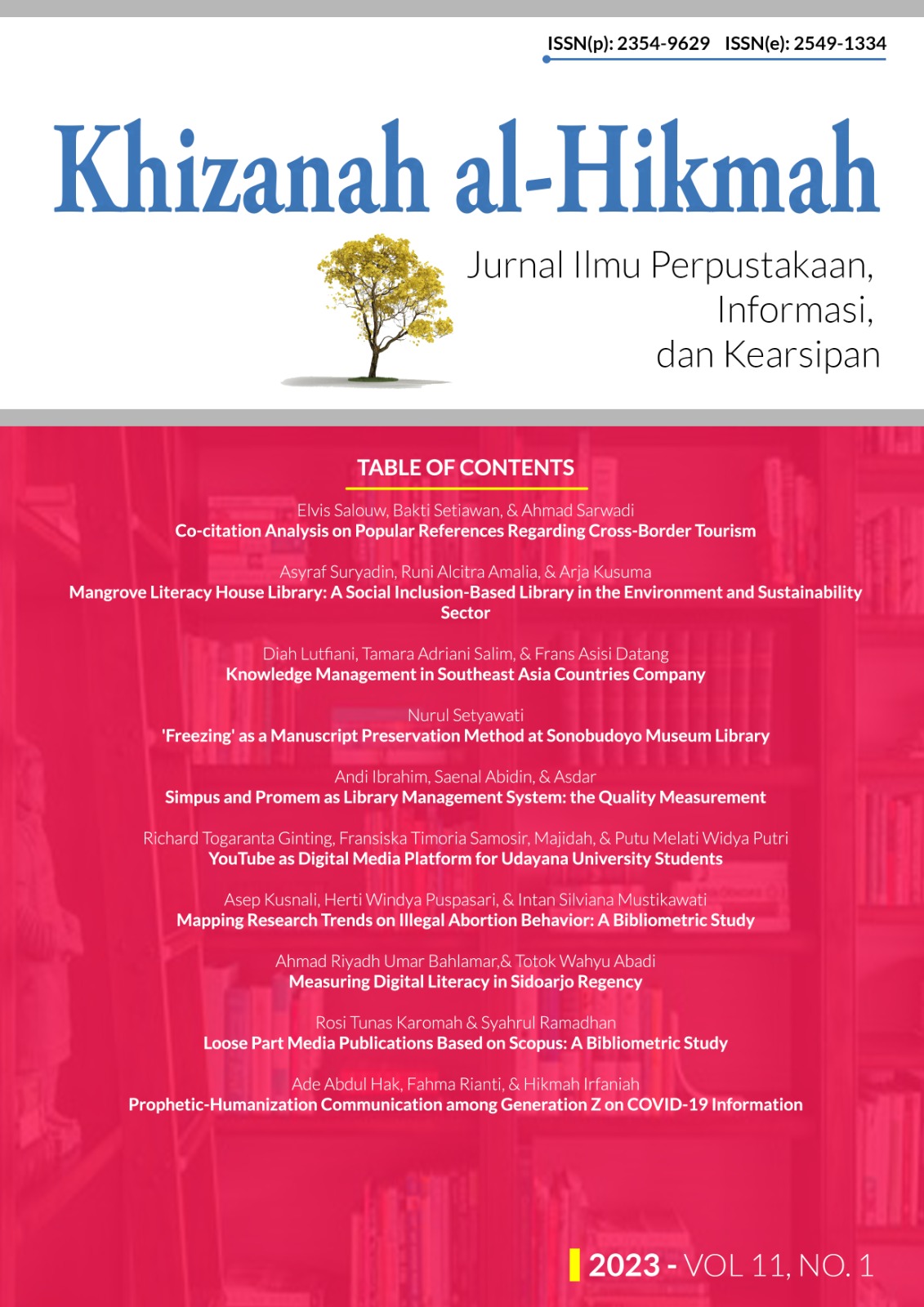Mangrove Literacy House Library: A Social Inclusion-Based Library in the Environment and Sustainability Sector
Abstract
Libraries are essential in educating people about sustainability and environmental issues, particularly in preserving East Belitung's mangrove ecosystems. The goal of this study is to determine how the Mangrove Literacy House Library, which the Peat and Mangrove Restoration Agency established in collaboration with the Environmental Council of Muhammadiyah Central Executive, has changed into a library that emphasizes social inclusion in the areas of environment and sustainability, particularly concerning the preservation of mangrove ecosystems. This qualitative descriptive study data is gathered through interviews, observation, and documentation and is then analyzed using Miles and Huberman's models. The findings of this study demonstrated that the RLM library works in partnership with the Sayang Kampong Farmers Group to increase public awareness of environmental issues and sustainability, particularly concerning the preservation of the mangrove ecosystems of East Belitung. Through this partnership, students learn about the environment and sustainability through reading activities at the RLM Library and hands-on experiences at the Sayang Kampong Farmers Group. Students can even put their knowledge of mangrove ecosystems they have learned about in the RLM Library into practice for the Sayang Kampong Farmers Group, making the RLM Library a library based on social inclusion in the environment and sustainability.
Downloads
References
Adji, P. A., & Salim, T. A. (2019). Transformasi perpustakaan Universitas Terbuka dalam memenuhi kebutuhan informasi mahasiswa. Jurnal IPI, 4(2), 150–158. https://jurnal.ipi.web.id/jurnalipi/article/view/54
Boyden, L., & Weiner, J. (2000). Sustainable libraries: teaching environmental responsibility to communities. The Bottom Line, 13(2), 74–83. https://doi.org/10.1108/08880450010327699
Fitriani, D. N., Niswa Nabila Sri Bintang Alam. (2019). Optimalisasi Perpustakaan RPTRA Berbasis Inklusi Sosial Untuk Masyarakat Kepulauan Seribu Yang Mengalami Eksklusi Sosial. Jurnal IPI (Ikatan Pustakawan Indonesia), 4(2), 159–170. https://doi.org/10.1234/JURNAL
Ismi, N., & Wijaya, T. (2021). Mangrove di Bangka Belitung, Antara Pelestarian dan Ancaman Pembukaan Tambak. Mongabay: Situs Berita Lingkungan. https://www.mongabay.co.id/2021/07/26/mangrove-di-bangka-belitung-antara-pelestarian-dan-ancaman-pembukaan-tambak/
K. Townsend, A. (2014). Environmental sustainability and libraries: facilitating user awareness. Library Hi Tech News, 31(9), 21–23. https://doi.org/10.1108/LHTN-07-2014-0059
Khalid, A., Malik, G. F., & Mahmood, K. (2021). Sustainable development challenges in libraries: A systematic literature review (2000–2020). The Journal of Academic Librarianship, 47(3), 102347. https://doi.org/10.1016/j.acalib.2021.102347
Lankes, R. D. (2012). Expect More: Demanding Better Libraries For Today’s Complex World. In Time.com.
Lloyd, A., Lipu, S., & Anne Kennan, M. (2017). On becoming citizens: examining social inclusion from an information perspective. Https://Doi.Org/10.1080/00048623.2016.1256806, 47(4), 304–315. https://doi.org/10.1080/00048623.2016.1256806
Mochammad, R., MS, R. A., & Cahyono, T. Y. (2020). Library 4.0: Eco-Blended Library and Library Inclusion. Khizanah Al-Hikmah : Jurnal Ilmu Perpustakaan, Informasi, Dan Kearsipan, 8(2), 116–129. https://doi.org/10.24252/KAH.V8I2A2
Perpustakaan Nasional Republik Indonesia. (2022). Tingkat Kegemaran Membaca Tahun 2021 –. Retrieved February 21, 2023, from https://satudata.perpusnas.go.id/index.php/2022/03/29/tingkat-kegemaran-membaca-tahun-2022/
Prasetyo, W. D., dan Utami,D. (2020). Penguatan Perpustakaan untuk Pembangunan: Sebuah Konsep Transformasi Berbasis Inklusi Sosial. Jurnal IPI (Ikatan Pustakawan Indonesia), 5(2), 293–299. https://doi.org/10.1234/JURNAL
Prasetyo, W. D., & Utami, D. (2020). Transformasi Perpustakaan dalam Rangka Mewujudkan Layanan Perpustakaan Yang Inklusif: Studi Kasus di Perpustakaan Umum Daerah Kabupaten Pulang Pisau. VISI PUSTAKA: Buletin Jaringan Informasi Antar Perpustakaan, 22(1), 35–46. https://doi.org/10.37014/VISIPUSTAKA.V22I1.681
Rusfiana, Y., & Hermawan, D. (2019). Potensi Bencana Alam pasca Penambangan Timah Inkonvensional di Kabupaten Bangka Tengah Provinsi Kepulauan Bangka Belitung: Perspektif Ketahanan Wilayah. Jurnal Konstituen, 1(1), 59–76. https://ejournal-new.ipdn.ac.id/FHTP/article/view/57-74
Sugiyono. (2017). Metode penelitian kuantitatif, kualitatid dan r&d. Alfabeta.
Suryadin, A., Akhmad Maulana, S., & Alcitra Amalia, R. (2021). Peningkatan Literasi Masyarakat Melalui Pojok Baca Sekaput di Warung Kopi. Berdikari: Jurnal Inovasi Dan Penerapan Ipteks, 9(2), 260–273. https://doi.org/10.18196/BERDIKARI.V9I2.11232
Suryadin, A., & Rostini, T. (2021). Muhammadiyah di antara novel dan memoar. Pustaka Diniyah.
United Nations Department of Economic and Social Affairs. (2016). Report on the World Social Situation 2016: Leaving no one Behind: The Imperative of Inclusive Development. United Nations. https://doi.org/10.18356/5AA151E0-EN
Usman, H., & Akbar, P. S. (2008). Metodologi Penelitian Sosial. Bumi Aksara.
Copyright (c) 2023 Asyraf Suryadin, Runi Alcitra Amalia, Arja Kusuma

This work is licensed under a Creative Commons Attribution-NonCommercial-ShareAlike 4.0 International License.
By submitting your manuscript to our journal, you are following Copyright and License

